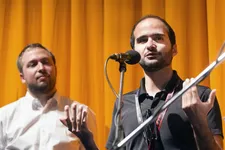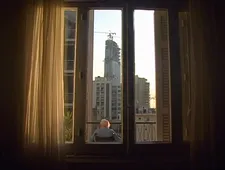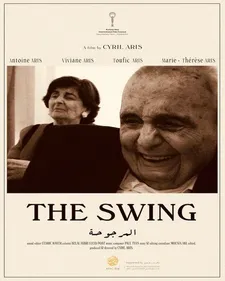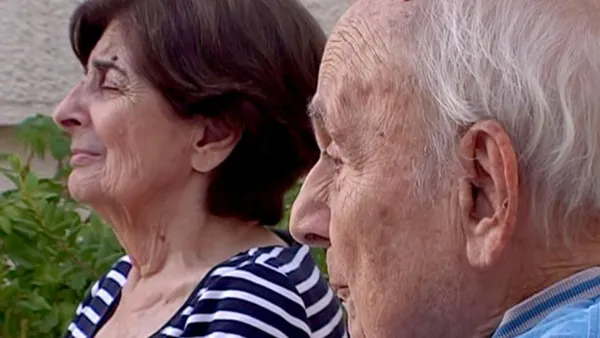Cyril Aris’ debut documentary The Swing offers an intimate portrait of his ageing grandparents Antoine and Viviane. He captures the way in which Antoine is readying himself for death but also the remarkable stoicism of Viviane who, after the death of one of their daughters, enters into a secret pact with the rest of the family to protect her husband, who has a very weak heart, from the news. I caught up with Aris at Karlovy Vary International Film Festival – where the film had its world premiere – to talk about the challenges of making it.
At what point did you decide you're going to actually film this?
Cyril Aris: So, it had been a few years that I had wanted to film them and that I had wanted to spend time with my grandparents and film them and their story. But I always kept postponing because I had other projects.
Then, when the incident happened and my aunt passed away that was the trigger for me - almost the excuse for me - to just go into filming and you know documented that, because I had kind of a narrative hook. I had a narrative to tell and it just made sense, but you know ironically the more I was filming them and the more I was cutting the film, the more I realised, oh, this actually goes beyond the narrative and you know it does raise questions about the elderly and the place of the elderly and what really remains by the end of life.
Because you’d been planning this for some time, had you already broached this with them and asked if they would mind you recording them?
CA: They were pretty happy. You know in Vivanne’s case, she was very happy because she was living this secret and she couldn't share her grief with her husband. She finally she found through the film and through the camera and through me, a channel to just get her emotions out and you know get her grievances out, which I think is very important in moving on because she was really stuck in the grieving limbo of not being able to share this with her husband.
So, you know although it's a very sad film the behind the scenes were actually much more joyful and every time she would see me you know coming with a camera she was like, ‘Oh!’ and she was putting make-up on.
You can see she’s enjoying the spotlight. It’s interesting that you talk about that closeted, because I wonder how you family felt about that. On the one hand they obviously doing it with the best of intentions to protect Antoine. But they seem to sort of ignoring the fact that basically it was killing her not to be able to share this terrible thing with the person she always shared things with. Did you speak to your family about that?
CA: That’s why quite early on there's a scene where I question one of the decision-makers, who was my father, so their son – ‘How long are we going to lie for?’ But I think that the whole issue is quite debatable because we knew that if we broke the news to him he would die and then she would find herself losing her husband and her daughter right away, which would be quite tough on her and even tougher than what it actually was in the film.
of the existence of the film. Viviane has a strong personality and she can take a lot. She's endured quite a lot in her life so they trusted that she would be able to take it in and do it out of love and you know out of the sacrifice for her husband. But absolutely there is this question of whether by protecting one you were indirectly killing the other.
One of the interesting things about your film is that it touches upon a thing that I think a lot of people don't realise, which is the way that old people grieve for the fact that they are about to die. This sort of pre-grieving process. We grieve when they’re gone but because they know they’re ‘leaving’, they start to grieve. You see that with Antoine, that he’s grieving for what he’s about to lose. Was that something that surprised you when you captured it?
CA: I was even inspired by the way he was preparing for death because he was so much at peace with it, you can see in the film multiple times that he's just very grateful for the life he’s had and by the end of it, he really says, ‘I'm ready. I just you know I just want to go. I'm OK.’ And up until the last day he was so much at peace. And it might be his personality or his philosophy on life or to his strong faith of, ‘It's God's will’.
 |
| Director Cyril Aris introduces the film in Karlovy Vary Photo: Film Servis Karlovy Vary International Film Festival |
Did it occur to you that, on some level, Antoine may have realised something had happened. I wonder if perhaps there's that sort of reflexive protection going on, so he in some way feels like he's also protecting something by not acknowledging the fact that he knows.
CA:I asked Viviane: ‘Do you think he knows?’ And she said:’ In my opinion he does and I think he’s just pretending. But maybe living in that doubt was keeping him going.
In terms of shooting the film, you keep quite a respectful distance quite often - was that something that you would decide from day to day?
CA: Well because I was shooting in the winter and then I was shooting in the summer you can notice that in the summer the camera is further and further away. And it kind of occurred naturally. I realise that it’s that thing of the warmer or the hotter the subject the colder the treatment because otherwise it just becomes too melodramatic and you just shut down. So, I felt that way sometimes not seeing them or like being like really away kept their dignity. Also, if it's too close it just kills it. It’s like having dramatic music over a dramatic scene, it just becomes so dramatic that you just shut down.
I was there for like maybe 12 hours a day so at some point they just forget the camera. Also that was one of the reasons why I chose to shoot mini DV and to have the smallest of these professional cameras, to really break the artifice of filmmaking. They become less and less aware. They knew that they were being filmed and recorded all the time but I guess after a month, you just you know forget about the camera and it's just there.
 |
| The Swing. Cyril Aris on his grandad: 'I was even inspired by the way he was preparing for death because he was so much at peace with it' Photo: Courtesy of Karlovy Vary International Film Festival |
CA: Well, this being my first feature, it had to be a story that I can tell. I think it's pointless to try to tell someone else's story or to try to tell something that's not really personal to you. Now I know this goes in the extreme of being really personal and but, as I said earlier, the story came to and it was just calling for it to be documented. Also Vivane’s relationship with the shoot and how happy she was with with the filming process really drove me to just film them more and more and more.
CA: Yes, of course. There's a scene at some point in the film when she's talking to him and he tells her: ‘I can't hear you.’ Then she turns to me and says: ‘Well, he can hear me’.
That made me realise that or I'm really filling the void. She's also constantly on the phone trying to talk to people. After 65 years of marriage when you're used to the other person and there's no more communication with that person because of that other person losing their physical abilities then you're just seeking for someone to talk . The fact that she channelled all of her feelings and her thoughts through the filming process and through me was quite beneficial for her.
How does the rest of your family feel about the film? Have they seen it?
CA: Actually, they saw yesterday for the first time. They were quite happy with it despite the secrecy and everything. They're taking responsibility for their decision and their secrecy. They were absolutely convinced of it at the time. There’s always been the question mark of like did we do the right - but that's independent of the film. I think they were happy because we’re immortalising them through the film. They're just happy that their story is being recorded. I was a bit apprehensive. I was happy that they would discover it in the context of a festival, and especially a festival like Karlovy Vary. With audiences, they can see the universal aspect to because I think that if they were watching it together on the on the small screen or on a DVD they would be much more self-conscious.
 |
| The Swing - poster |
But here when they're seeing people react and at the Q and A afterwards they saw how people related to it. I guess if they saw the more universal aspect. For me that was clearly the biggest challenge, because when you care so much about the characters and it's personal to you, it’s how to translate that to people don't care. How to make people care about these characters as much as I do. That's why post-production took some time. Another filmmaker, Mounia Akl, was helping me a lot in that regard because she was the more objective eye.
What are you planning to do now?
CA: Before doing this film, I was I was working in fiction so now I'm just writing my first feature. I'm just going back to what I you know I want to do. I never intended to have to really do a documentary but you know when you're faced with a story like that it's just you have to.






















